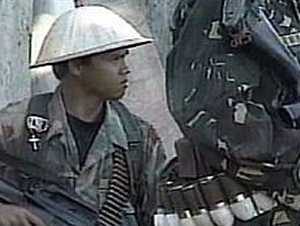| U.S. officials worry
Philippines could be al-Qaida’s next stop
“WE DO HAVE a worry
that as al-Qaida and other groups disperse from Afghanistan they are going
to look for places to go,” Robert Pitts, the charges d’affairs at the U.S.
Embassy in the Philippines, told MSNBC.
“We think it is an
opportune time to put into the hands of the Filipino government the tools
necessary to police and to combat that.”
More than 200 U.S. troops
have been sent to the island nation to help Philippine forces fighting
the Abu Sayyaf, an Islamic militant group that established ties with al-Qaida
in the 1990s, and more American soldiers are on the way.
Some of them will be stationed
on the southern islands, where Abu Sayyaf is holding two Americans and
a Filipino hostage. The American forces are there to observe and train
Philippine troops, both in camps and in the field.
Philippine officials have
said the American contingent will total about 600, including 160 U.S. Army
Special Forces.
During a November meeting,
President Bush promised Arroyo nearly $100 million in aid and military
assistance.
Philippine President Gloria
Arroyo has said that no American soldiers will be allowed to fight on the
front lines. The Philippine constitution bans foreign troops from fighting
on its soil.
NO HARD EVIDENCE
Though there is no hard
evidence that al-Qaida has set up shop in the Philippines, the United States
believes international terror groups could find it attractive
If I were planning where
to put sleeper cells I would put one or two here,” said Pitts. “I wouldn’t
think this would be a safe haven that al-Qaida could come over lock, stock
and barrel and set up a tent and operate. But I do think it is possible
for individual members to lie low here.”
In an interview with MSNBC,
Arroyo said international terrorists would be unable to enter the Philippines.
“Even now I would like to
say there is ‘no room at the inn’ and there is no place they can go where
they will feel safe here,” the president said.
The country’s own battle
with the Abu Sayyaf has exhausted resources, scared away foreign investors
and proved largely unsuccessful. Arroyo is hoping that the U.S. aid and
military cooperation will help rid her country of the Abu Sayyaf for good.
If I were planning where
to put sleeper cells I would put one or two here,” said Pitts. “I wouldn’t
think this would be a safe haven that al-Qaida could come over lock, stock
and barrel and set up a tent and operate. But I do think it is possible
for individual members to lie low here.”
In an interview with MSNBC,
Arroyo said international terrorists would be unable to enter the Philippines.
“Even now I would like to
say there is ‘no room at the inn’ and there is no place they can go where
they will feel safe here,” the president said.
The country’s own battle
with the Abu Sayyaf has exhausted resources, scared away foreign investors
and proved largely unsuccessful. Arroyo is hoping that the U.S. aid and
military cooperation will help rid her country of the Abu Sayyaf for good.

|
